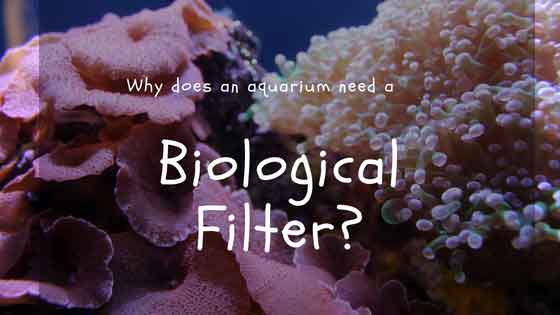[ad_1]
Why does an aquarium need a biological filter?
The biological filter is the solution to this wast management problem in your tank. Your fish and corals eat, drink pee and poop in the water in your tank. Also, the left-over food in the tank doesn’t ever get cleaned up and the only time you ‘take out the trash’ is when you perform a partial water change.
Sorry if that sounds a bit gross (I slightly embarrassed to admit that I enjoyed typing ‘pee and poop’ as much as I did), but I say it to make a point that the water in the tank gets fouled. Since you probably aren’t doing water changes every few hours, the biological filter becomes critically important.
All of those biological activities (do you like that term better?) and the food waste creates a chemical in the water, called ammonia. Ammonia, ironically, is one of the main ingredients in some chemical cleaners you may use in your house…which begs the question…why buy those cleaners when you could use dirty fish tank water?
I’m sorry, I digress. Nobody is asking THAT QUESTION.
Back to the ammonia waste.
Ammonia is toxic to the animals in your water. At best, it causes chemical burns (you may see labored breathing with your fish if the ammonia levels are high—this is a symptom caused by the ammonia burning their gills).
About the biological filter
The biological filter is the solution to this wast management problem. But the term biological filter causes some confusion—because when people hear or read the word, “filter”, their first thought is of a plastic thing that cleans their water. Don’t believe me, think back 5 seconds ago to when you read the word filter—what did you think?
But the reality is that you don’t need a plastic thing called a filter to have a biological filter in your tank. Because the key word there is “biological”. You see, the biological filter is a living thing. It is millions of bacteria living in your tank—on the glass, on the sand, and especially on the live rocks. That’s one of the big reasons saltwater aquarium owners keep live rocks in their tanks.
The bacteria in your tank will work for food. Their food is that waste I was rambling about, at the beginning of this article. Those helpful bacteria use the ammonia up as food and turn it into their own waste product, called nitrite.
Uh-oh, what are you going to do with nitrite? Well, the good news is that the nitrite is food for another group of bacteria, that get along fine with the first group of bacteria. They also live all over all the surfaces in your tank, and they eat the nitrite and turn it into nitrate.
Most of the fancier, harder-to-keep invertebrates in the reef tank hobby don’t love nitrate, but they tolerate it a lot better than ammonia, which gives you some much-needed rest in between water changes.
And that’s why an aquarium needs a biological filter.
Where do you buy a biological filter?
The good news here is that you don’t need to buy a biological filter. You see, the filter is natural. Naturally occurring bacteria will begin to grow and multiply in your tank, eating that waste and converting it into nitrate.
All you need to do is give it a place to live. That place to live is called a substrate.
The bacteria will grow on just about any surface in your tank and sump area that is submerged underwater.
Many of us (myself included) add rocks and sand to provide a natural substrate for your tank that also supports the growth of these beneficial bacteria. Sand and rock that have active bacterial or invertebrate life colonizing their surfaces are called live rock and live sand, respectively.
Any rocks or sand in your tank will become ‘live’, eventually. You can give your biological filter a jump start by purchasing and adding live rock, live sand or a bacterial supplement.
What about that plastic filter from my freshwater aquarium, do I need one of those?
You certainly could run a hang-on-back filter or canister filter, as a way of supplementing the filtration capacity of your tank, but generally speaking, as long as you have live rock or a sandy substrate with decent water-flow, you don’t need to buy a power filter–with a couple exceptions and clarifications (see the next point).
Filter sock
If you have a sump, you may want to use a filter sock. It looks just like it sounds.
In the saltwater hobby, there is a specialized piece of equipment, called a protein skimmer. It isn’t a filter, exactly, but it does improve the quality of your water by pulling bad stuff out of the water.
If you can afford it and have the room, you may want to buy one of those. You can learn more about them and see some product reviews here.
For more information
Check out these other helpful articles:
Most important reef tank water parameters
Best reef tank aquarium salt
Protein Skimmer product review
[ad_2]
Source link

